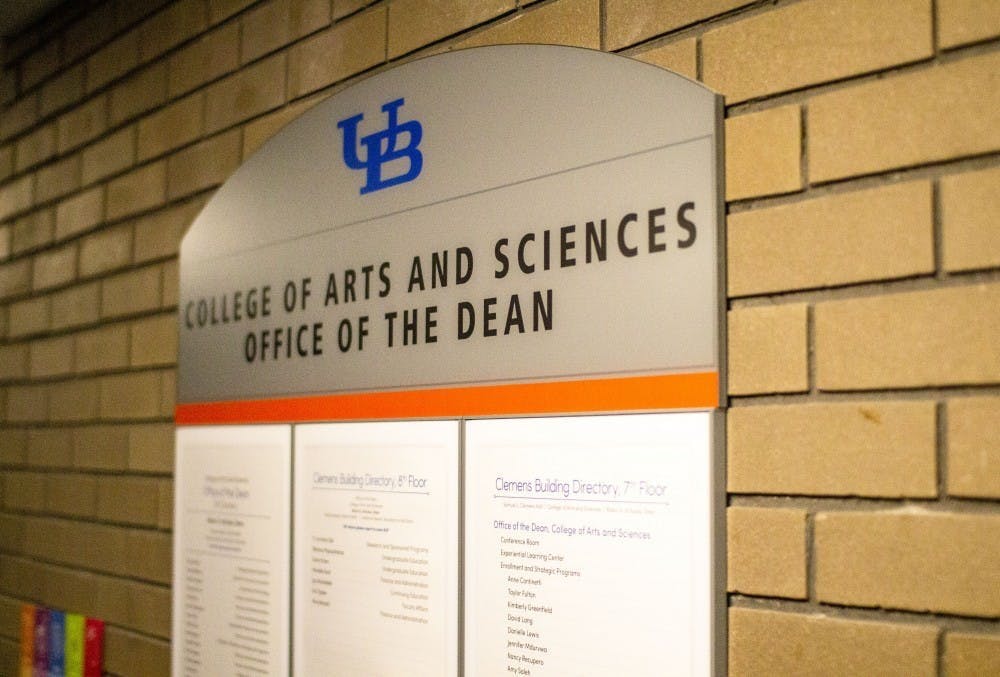During a heated two-hour meeting on Tuesday, a group of Black Council members challenged College of Arts and Sciences Dean Robin Schulze on UB’s minority hiring and retention process, on the low numbers of black faculty and on the future of the struggling African and African American Studies Program.
Schulze came to the meeting on the invitation of the students and spent much of the session defending her policies and choices. The 20 students pressed her on her commitment to the AAS program and she responded that she has “committed” $500,000 so that AAS can separate from Transnational Studies and “relaunch.” The program currently has three faculty members.
She also discussed the SUNY-funded, five-year ProdiG program, which will begin in fall 2020 and is designed to increase minority hires. According to the program, SUNY will pay new black faculty members’ full salaries for the first year, half for the second and a quarter for the third.
At the town hall, Schulze mentioned Maura Belliveau, director for UB’s Center for Diversity Innovation, who has been at UB since 2019, will "oversee the Center’s Distinguished Visiting Scholars program, a one-year residential program for faculty to advance diversity, equity and inclusion at UB," according to the dean's office. Belliveau's previous work has involved diversity "research, training and service" at Duke, Emory, and Texas A&M University, according to the dean's office. Schulze plans to hire UB alum and Duke AAS Chair Mark Anthony Neal, as a facilitator to restructure the program.
Despite Schulze’s optimism, most students were skeptical about UB’s commitment to diversity and to hiring black faculty outside of AAS. BSU Historian Josephina Nimarko, a junior nursing major, also questioned Belliveau’s experience and ability to attract black candidates.
“Oftentimes people tend to go talk to people they look like,” Nimarko said. “Like a black person may not feel comfortable going to talk to [Belliveau], but if you brought somebody who does look like them then they’ll be like, ‘Oh shoot the school really needs black people. This is a black person telling me that and now I’m more inclined to go over there and listen and potentially apply for that position.’”
Schulze said Belliveau has experience from “a lot of organizations” and “knows every African American in her field.” Belliveau came to UB from Long Island University where she was an associate professor of management. She received her Ph.D. in organizational behavior and industrial relations from University of California, Berkeley. She is the first to hold this office at UB.
Schulze also said SUNY will allow CAS to practice targeted hiring, but the college can’t ensure new hires will be black because it would be "discriminatory."
“It’s discriminatory for us to go out and say we’re only going to hire an African American scholar,” Schulze said. “We go out, we ask for the very best scholars who work on ‘blank and blank,’ we look at the pool that comes in and then we are sensitive inside the structure of that pool to get people of color. But by New York state law, just in the same way we can’t say ‘whites only’ we can’t go out and say ‘only blacks.’”
Keith Griffler, an AAS professor, said he had no idea Neal would be involved in the hiring of new faculty and said he was frustrated because the “faculty has been essentially cut out of this process.”
“Our concern is that we have voiced again and again that African American Studies is still here and it doesn’t need to be reconstituted. All of the people here are taking our courses and we have wonderful teachers teaching our courses,” Griffler said to Schulze. “So it concerns me deeply to hear that you don’t trust us enough to take on this responsibility ourselves. We have been doing this for decades.”
Teaching assistant James Ponzo also agreed, saying the professors already in the department “should be the ones that drive the process.”
Nimarko said many people in the meeting were shocked to find out AAS faculty wasn’t notified about the facilitator and said most don’t feel as though the meeting was as “progressive” as everyone wanted it to be.
“A lot of it now is just to wait but still continue to demand,” Nimarko said. “One of the biggest things that I know I personally would like to see is the [AAS Program] involved in the new planning for this new project and to bring more diverse people in the school.”
Alexandra Moyen is a senior news editor and can be reached at Alexandra.Moyen@ubspectrum.com and on Twitter @AlexandraMoyen.
CORRECTION: A previous version of this article defined Belliveau's role as "overseeing the hiring process to ensure black faculty are prioritized," but the CAS dean's office said it defines her director of Center for Diversity Innovation role as overseeing "the Center’s Distinguished Visiting Scholars program, a one-year residential program for faculty to advance diversity, equity and inclusion at UB."

Alexandra Moyen is the senior features editor of The Spectrum.





